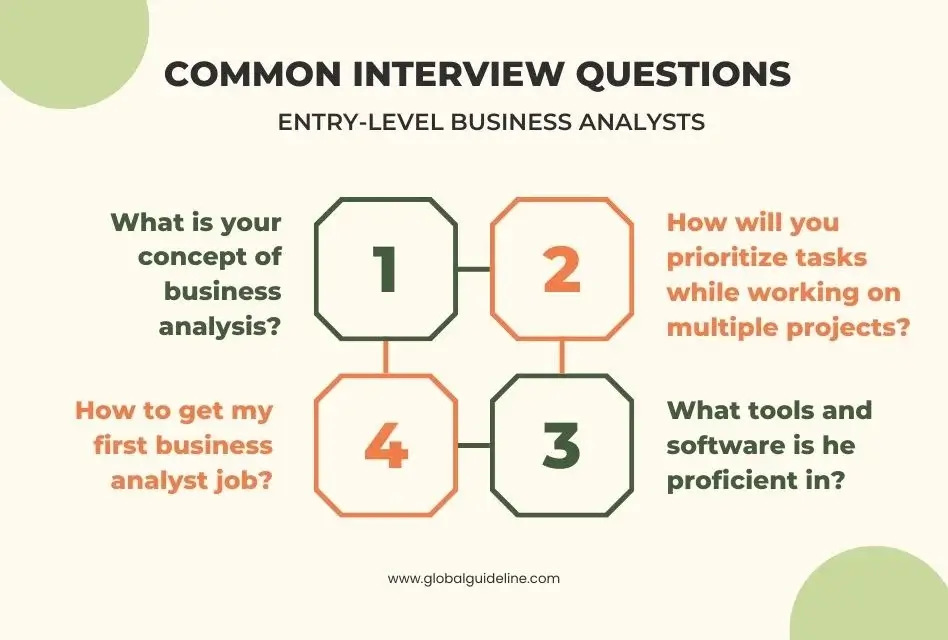Business Analyst is rapidly turning out to be one of the central jobs in today’s fast-paced enterprise environment. An entry-level business analyst professional opens doors to endless career prospects, benefits, and opportunities. Be it a fresher or someone wanting to change your line of profession, entry level business analyst careers are proving to be a promising career path. It is here that we would come out and share with you six of the significant benefits of entry level business analyst jobs in the United States and how to get a start into this fast-paced field.
Table of Contents

Understanding the Entry-Level Business Analyst
Before listing the advantages, let’s explain what exactly an entry-level business analyst does. Business analysts improve business processes through the interpretation of data and recommendations on certain actions. They serve as the connecting link between the IT and the business department because they ensure that the technological solutions provided are in line with achieving the business objectives.
Key Responsibilities:
- Requirements gathering
- Data analysis
- Business process improvement
- Project management support
- Stakeholders’ communication
1. Job Market Demand
One of the great benefits that a career as an entry-level business analyst comes with is the high demand that the job market has for people in this area of specialization. Given that businesses today want to make data-driven decisions, there is a demand for business analysts that is ever-increasing. In fact, according to the Bureau of Labor Statistics of the United States, from 2020 onward, job employment for business analysts is likely to see a growth rate much faster than the average for all occupations.
Entry Level Business Analyst Jobs (With No Experience)
Those of you who may be asking, “Can I work as a business analyst with no experience?”, yes, most of the companies hire an entry-level business analyst, especially those with strong analytical skills and who are willing to learn. A good number of entry-level remote business analyst jobs are available, offering flexibility and work-life balance.
2. Various Career Options
Another positive thing about choosing a business analyst entry-level career is that it opens so many avenues in the field. Whether it’s project management, data analysis, or information technology, whatever catches one’s attention, business analysts have a leading-edge background in all these aspects.
What is the career path for a Business Analyst?
The career path for a business analyst depends on the industry and nature of specialization. Normally, the entry-level business analyst’s career progression might come in the form of Senior Business Analyst, Project Manager, and IT Director. Furthermore, several skills learned in this particular domain open other career avenues, too.
3. Competitive Salaries
Entry-level business analysts can thus expect to receive a good remuneration package in the USA, with quite a number of posts offering growth potential as your experience grows. The average estimate in salary packages for an entry-level business analyst is within the bracket of $60,000 to $70,000 annually, depending on the location and industry.
Entry Level Business Analyst Jobs Near Me
When searching for “entry level business analyst jobs,” the salary for the job as well as growth should be an important point to note. Most companies also offer better career opportunities with salary raise and bonuses as per work performance.
4. Remote Job Opportunities
In the raised demand for a remote job along with this popular digital world, even business analysts are in high demand. This fact is particularly true considering that business analysts mainly deal with data, meaning they can work from virtually anywhere.
Entry Level Business Analyst Careers Remote
Remote working is flexible and hence facilitates a good work-life balance. A large number of companies in the USA offer remote entry-level business analyst opportunities. If you would not like going out to work, or need to organize your schedule for some reason, this may be the best option for you.
5. Development of Valuable Skills
Entry-level business analysts have great opportunities to build highly valued technical and soft skills: from mastering data analysis tools to honing communication capabilities. In the following section, we discuss those entry-level business analysis skills that would be handy in a lifetime.
Entry-Level Business Analyst Certification
Adding an entry-level business analyst certification will even better equip you with more skills and make you more appealing to an employer. Certifications like the Entry Certificate in Business Analysis™ (ECBA™) give you a solid grounding in the basics of the field and keep you ahead of other candidates.
6. Accessibility to Freshers and Career Changers
Entry-level business analyst careers are open to many people-right from freshers to career changers. You could enter this field without prior experience, provided you get proper training and are determined to make it happen.
Entry Level Business Analyst Careers for Freshers
They can start their journey by applying for internships or junior business analyst positions. These provide good experience, and once you have them, you can always work your way up. Many companies also provide training programs so that you get running as soon as possible.

Preparing for Your First Business Analyst Job
After deciding to pursue an entry-level business analyst career, preparation for an entry-level business analyst career is in order. Well, here are some pragmatic steps to get you started:
How to Pursue Entry Level Business Analyst Careers?
- Gain Relevant Education: While traditionally a bachelor’s degree in business, finance, or other related fields has been among those requirements, IT and engineering degree courses may also be useful.
- Develop Technical Skills: Develop in Excel, SQL, and Tableau. In addition, learn methodologies around business analysis.
- Develop Soft Skills: Proper communication, problem-solving, and critical thinking.
- Get Certified: As mentioned earlier, being certified has the potential to give you an advantage over your rivals.
- Create a Strong Resume: Highlight education, skills, and any relevant experience. Tailor-make your resume for each job application.
- Network: Utilize LinkedIn, industry forums, and networking events to connect with individuals in the field.
Common Interview Questions for Entry-Level Business Analysts
Preparation is the key to land your first business analyst job. Following are some common business analyst interview questions which you may encounter while in this field:
- What is your concept of business analysis?
- Can you tell about any instance when you had to analyze certain data to identify and solve a specific business problem?
- How will you prioritize tasks while working on multiple projects?
- What tools and software is he proficient in?
- Describe for me a situation where you had to explain some complex information to a nontechnical audience.
FAQs
Can I be a business analyst without experience?
Yes, many companies are willing to hire an entry-level business analyst that has no prior experience in the field. This is true, especially if you have any relevant analytic capabilities or a hearty willingness to learn. You can consider internships, certifications, and courses related to it for added qualification points.
How to get my first business analyst job?
This would involve pursuing the relevant education, development of technical and soft skills, networking, job search-tailoring one’s resume to each application-and apply for any internship or junior opening available.
What is a career path for business analysts?
This would imply an entry-level career path that moves the business analyst up the ladder to levels such as Senior Business Analyst, Project Manager, and IT Director, among others. Since multiple career opportunities may be opened, the skills earned can be transferred to other fields.
Must a Business Analyst Have an MBA?
Generally, business analyst entry-level positions do not require an MBA, though such a degree has its advantages in career growth. Most business analysts are successful with just a bachelor’s degree and corresponding certifications.
Is business analyst an IT job?
Even as business analysts interact much with IT teams, the role is strictly not an IT job. Business analysts are more engrossed in enhancing business procedures through data analysis and collaboration with stakeholders.

Conclusion
A career as an entry-level business analyst is immensely promising, with great opportunities for people who would like to join the business analysis field. As a matter of fact, this field has emerged as quite an attractive option for fresh graduates and career changers due to reasons such as high demand, varying career options, good remuneration, and an option for remote working. All that one needs to get started for success in this dynamic, growing, and rewarding field is the right skill set and relevant certifications.
If you’re ready to make that move into an enriching career in business analysis, take the chance to get started by reading about Entry Level Business Analyst Careers, and prepare for the rest of your journey. From a field of business analysis out of college or changing careers, the potential seems endless.










